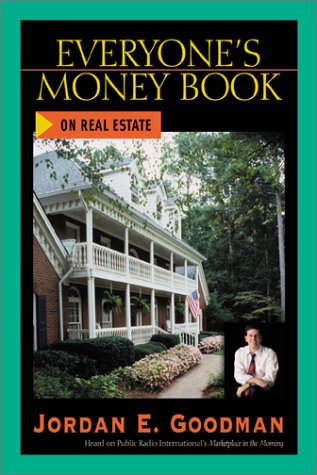Everyone's Money Book on Real Estate - Softcover

Despite the hurdles and headaches sometimes presented by owning your own home, most Americans aspire to stop renting, and many in fact do! Almost 2/3 of all Americans own the home in which they live. Personal finance expert Jordan Goodman's new book Everyone's Money Book on Real Estate teaches everyone from the first time homebuyer to the investor what they need to know about real estate.
"synopsis" may belong to another edition of this title.
However, making the decision to buy real estate for personal shelter or investment can have a dark side: a home can become a huge liability, sapping your finances and burdening you with debt and obligations that ruin your lifestyle. That is why it’s so important to understand how different real estate investments work. With a better understanding of the different types of real estate investments, you can determine what is best for you. This book will guide you through two processes: choosing and financing your own home, and investing in real estate for financial security and gain.
Throughout the 1970s and early 1980s, real estate was the sure-fire way to accumulate wealth. The combination of a housing shortage, a surging number of baby boomers entering the real estate market, generous tax advantages, and high inflation expectations resulted in startling gains in home prices. The bubble burst in the mid-1980s and continued into the 1990s, however, as most housing markets became overbuilt, fewer boomers could afford homes, tax breaks were curtailed, and inflation plunged. By the end of the 1990s and into 2000, real estate prices again shot up, only to soften with the economic slowdown of the early 2000s. Despite low interest rates and nearly nonexistent inflation, this watershed event sent most segments of the economy into an even more pronounced tailspin. The real estate landscape is, therefore, much more treacherous now, particularly if you purchase a home as an investment rather than a comfortable place in which to live.
Many people who bought homes at inflated prices now feel burdened by huge mortgage payments on property that has fallen sharply in value. These homeowners often rationalize their purchase by saying, "We couldn’t stand not earning any mortgage interest deductions to lower our taxes" or "We had to buy before prices got out of reach." In retrospect, these buyers’ financial situations might have been improved if they had rented for less than their current monthly mortgage payment, owed a bit more in taxes, and invested the difference between their rent and their mortgage payment in the surging stock and bond markets. The economic boom of the late 1990s and early 2000s brought some relief to these homeowners in areas of the country where housing prices recovered substantially, encouraging real estate investors to jump on and take a ride on another real estate boom bandwagon.
The makeup of American households has changed substantially over the past few decades. According to Rutgers University’s National Marriage Project, the majority of Americans don’t have a child at home. Today, only about one-third of U.S. households contain children. In addition to this, fewer couples are marrying, and more than half of those who do wed for the first time are living together before tying the knot. Single motherhood is also a growing segment that was once considered an exception to the rule a generation ago. Because of demographic changes such as these, housing needs are changing as well, with far more singles and single parents buying homes than ever before.
Baby boomers, the postwar generation that makes up a huge segment of the population, is now another force changing the landscape and buying habits of America. As the leading edge of this generation gets used to the proverbial empty nest and begins to think about what is now called active retirement, housing options become even more diverse.
Whichever demographic niche you occupy, it’s important to understand where your investment dollar may stretch farthest. This book will guide you through the two important processes of choosing and financing your own home, and investing in real estate.
Everyone’s Money Book on Real Estate would not have been possible without the extreme hard work of real estate writer Dena Amoruso, who expertly pulled together the threads of this book into a wonderful and comprehensive resource on everything you need to know about real estate. I also want to thank Gerald J. Robinson, a New York-based real estate tax attorney and author of Federal Income Taxation of Real Estate, who gave generously of his time and ideas to make this book as complete and accurate as possible.
"About this title" may belong to another edition of this title.
- PublisherKaplan Publishing
- Publication date2002
- ISBN 10 0793153808
- ISBN 13 9780793153800
- BindingPaperback
- Number of pages208
Buy New
Learn more about this copy
Shipping:
US$ 3.99
Within U.S.A.
Top Search Results from the AbeBooks Marketplace
Everyone's Money Book on Real Estate
Book Description paperback. Condition: New. Has stickers on cover. Otherwise in new condition.Over 1,000,000 satisfied customers since 1997! Choose expedited shipping (if available) for much faster delivery. Delivery confirmation on all US orders. Seller Inventory # 432817
Everyone's Money Book on Real Estate
Book Description Paperback. Condition: New. Seller Inventory # DADAX0793153808
Everyone's Money Book on Real Estate
Book Description Paperback. Condition: New. Seller Inventory # Abebooks216680

